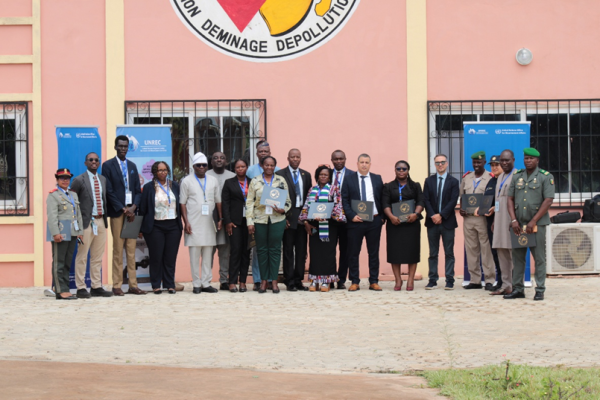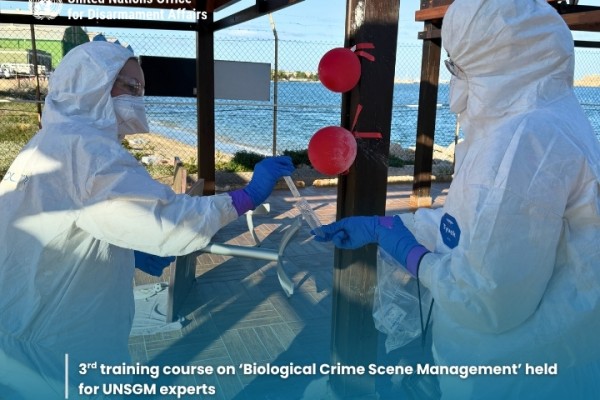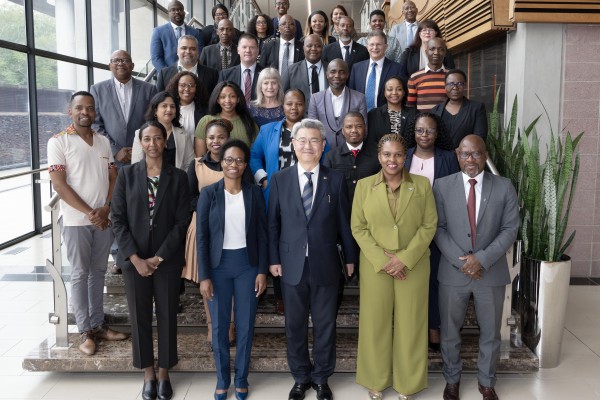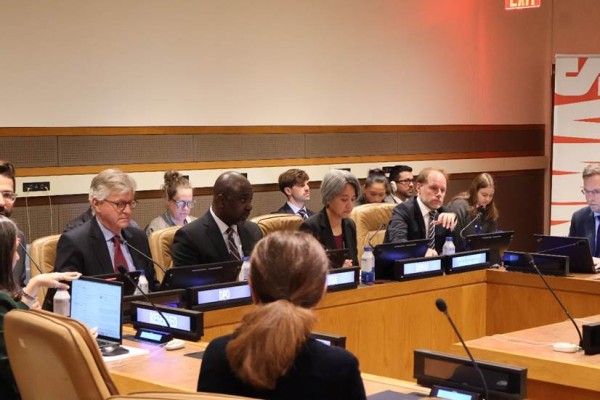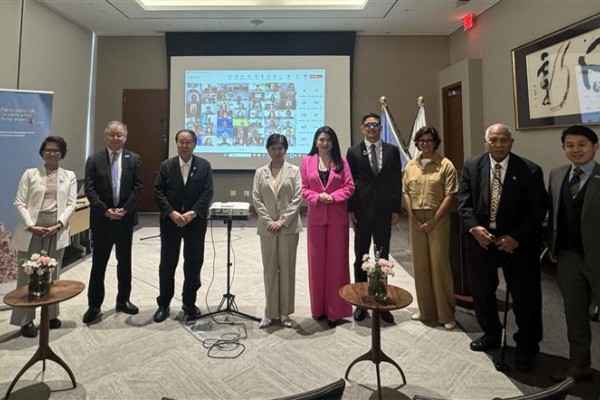From 3-7 November 2025, the United Nations Office for Disarmament Affairs (UNODA), in cooperation with INTERPOL’s Bioterrorism Prevention Unit and the Public Health Agency of Canada’s National Microbiology Laboratory, organized a training course on biological crime scene management for the United Nations Secretary-General’s Mechanism for Investigations of Alleged Use of Chemical and Biological Weapons (UNSGM) at the United Nations Global Service Centre – Conference and Learning Centre (UNGSC-CLC) in Brindisi, Italy.
This was the third course on the topic organized for UNSGM experts. As with past iterations, the objective was to provide qualified experts nominated by Member States to the UNSGM roster with a better understanding of sampling and evidence management in the context of a possible UNSGM investigation. A group of 15 experts on the UNSGM roster from 15 countries, representing all UN regional groupings, participated in this year’s course.
Training elements included both lectures and practical components. To begin, a representative from UNODA provided the participants with a refresher on the mandate and procedures for a potential UNSGM investigation – the context for which they would be asked to apply the skills covered throughout the rest of the course. Then, representatives from INTERPOL provided instructions to the participants on crime scene operations in an environment that is potentially biologically contaminated. This included a procedure for putting on and taking off personal protective equipment, considerations to access a contaminated scene, initial scene assessment, briefing and sampling strategy, as well as evidence packaging and crime scene documentation. Representatives from the Public Health Agency of Canada complemented these sections with training components on environmental sampling, field testing, laboratory analysis, and evidence transportation. A representative from the UN Department of Safety and Security (UNDSS) also provided participants with a refresher on field communications systems that may be used during UNSGM operations, including radio procedures and reporting protocols. The course concluded with a one-day field exercise, in which participants were asked to conduct sampling and evidence management operations in two scenarios with scenes potentially contaminated with biological material.
This advanced skill training course provided the experts with more in-depth understanding of bringing together different elements of a potential UNSGM investigation, including working in a potentially contaminated environment, as well as collecting and managing evidence.
In addition to the support described above, financial support for the workshop was generously provided by the Governments of Canada and the United Kingdom.
For more information on the UNSGM workshop, please contact the UNODA team in support of the UNSGM at UNSGM@un.org.
***************************************************************************************************************************
Du 3 au 7 novembre 2025, le Bureau des affaires de désarmement des Nations Unies (UNODA), en coopération avec l'Unité de prévention du bioterrorisme d'INTERPOL et le Laboratoire national de microbiologie de l'Agence de la santé publique du Canada, a organisé un cours de formation sur la gestion des scènes de crime biologique pour le Mécanisme d'enquête du Secrétaire général des Nations Unies sur l'utilisation présumée d'armes chimiques et biologiques (UNSGM) au Centre de services mondiaux des Nations Unies - Centre de conférences et d'apprentissage (UNGSC-CLC) à Brindisi, en Italie.
Il s'agissait du troisième cours sur ce thème organisé à l'intention des experts de l'UNSGM. Comme lors des éditions précédentes, l'objectif était de permettre aux experts qualifiés désignés par les États membres pour figurer sur la liste de l'UNSGM de mieux comprendre les questions d'échantillonnage et de gestion des preuves dans le cadre d'une éventuelle enquête de l'UNSGM. Un groupe de 15 experts figurant sur la liste de l'UNSGM et provenant de 15 pays, représentant tous les groupes régionaux des Nations Unies, a participé au cours de cette année.
La formation comprenait à la fois des cours magistraux et des travaux pratiques. Pour commencer, un représentant de l'UNODA a rappelé aux participants le mandat et les procédures d'une éventuelle enquête de l'UNSGM, contexte dans lequel ils seraient amenés à mettre en pratique les compétences acquises tout au long du cours. Ensuite, des représentants d'INTERPOL ont donné aux participants des instructions sur les opérations sur les lieux d'un crime dans un environnement potentiellement contaminé biologiquement. Cela comprenait la procédure à suivre pour enfiler et retirer l'équipement de protection individuelle, les considérations relatives à l'accès à un lieu contaminé, l'évaluation initiale des lieux, la stratégie d'information et d'échantillonnage, ainsi que l'emballage des preuves et la documentation des lieux du crime. Des représentants de l'Agence de la santé publique du Canada ont complété ces sections par des modules de formation sur l'échantillonnage environnemental, les tests sur le terrain, les analyses en laboratoire et le transport des preuves. Un représentant du Département de la sûreté et de la sécurité des Nations Unies (UNDSS) a également proposé aux participants une mise à jour sur les systèmes de communication sur le terrain pouvant être utilisés lors des opérations de l'UNSGM, notamment les procédures radio et les protocoles de rapport. Le cours s'est conclu par un exercice sur le terrain d'une journée, au cours duquel les participants ont été invités à mener des opérations d'échantillonnage et de gestion des preuves dans deux scénarios avec des scènes potentiellement contaminées par des matières biologiques.
Ce cours de formation avancée a permis aux experts d'approfondir leurs connaissances sur la manière de rassembler les différents éléments d'une enquête potentielle de l'UNSGM, notamment le travail dans un environnement potentiellement contaminé, ainsi que la collecte et la gestion des preuves.
Outre le soutien décrit ci-dessus, l'atelier a bénéficié d'un généreux soutien financier des gouvernements du Canada et du Royaume-Uni.
Pour plus d'informations sur l'UNSGM, veuillez contacter l'équipe de l'UNODA à l'adresse UNSGM@un.org.
